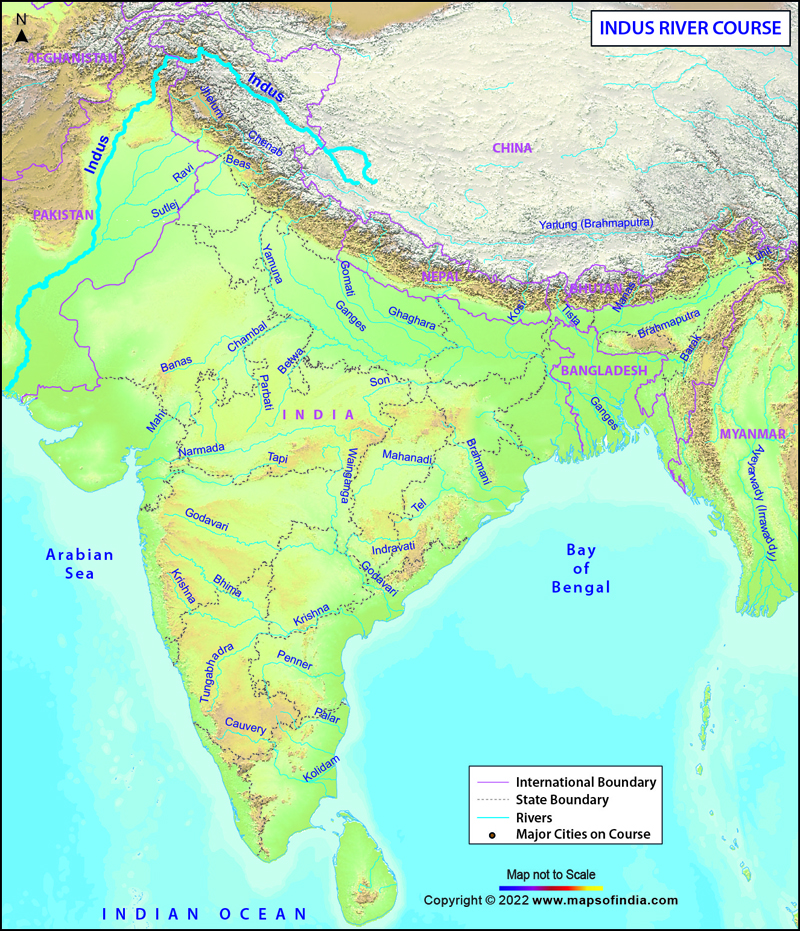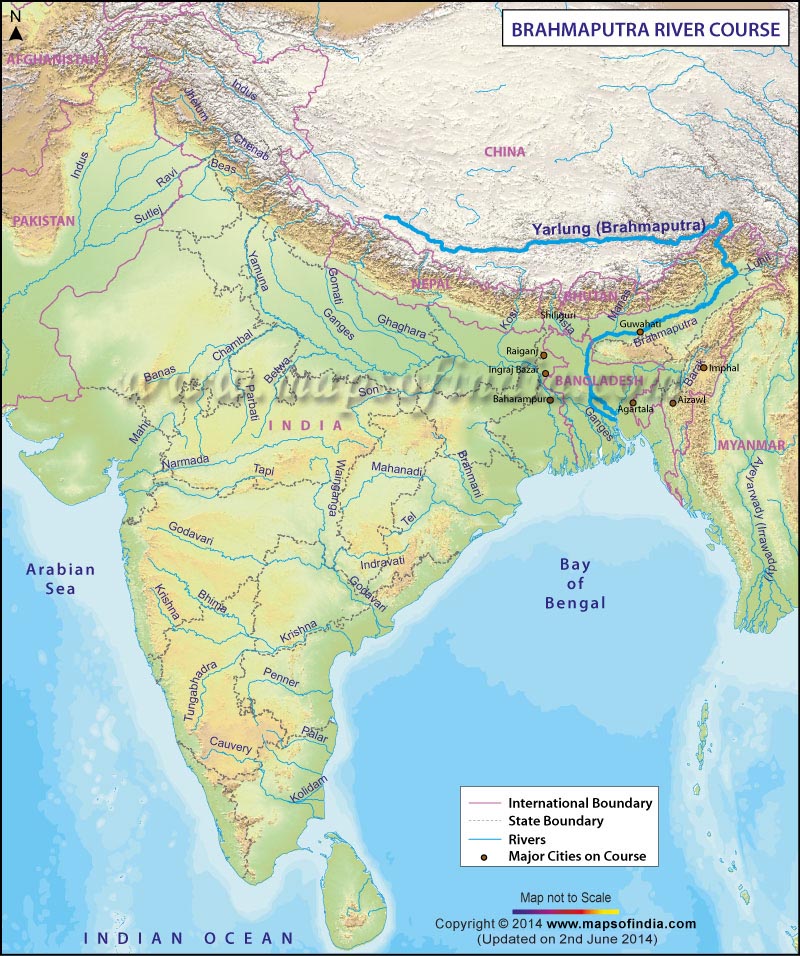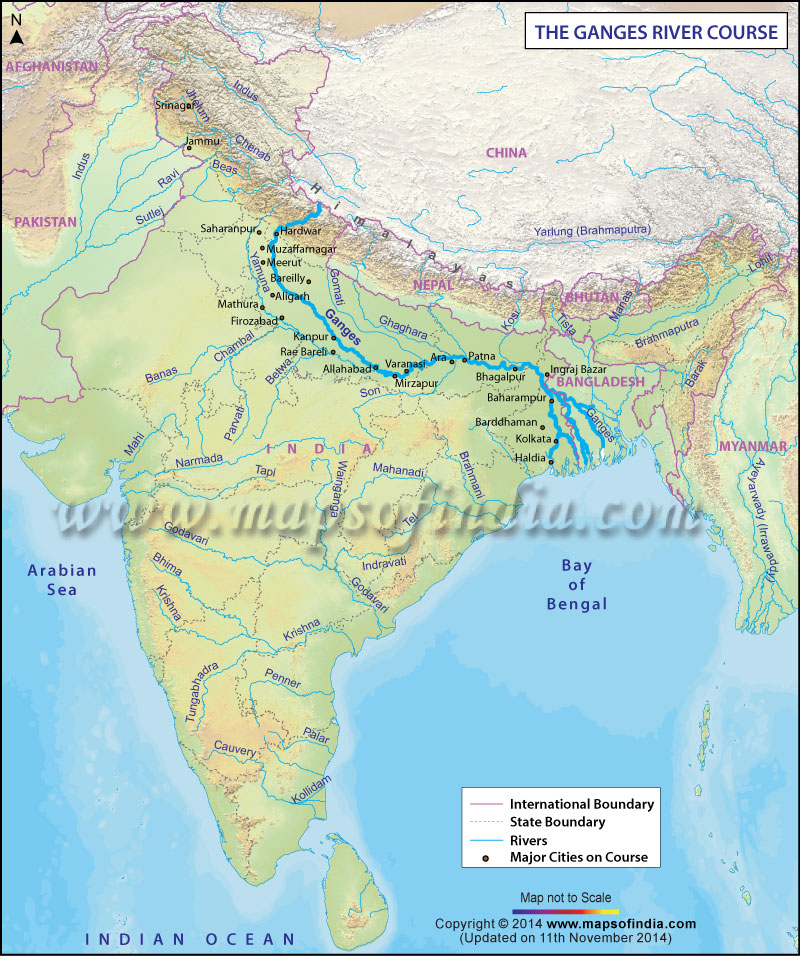
Indus River
1) Which is the longest
river of the Indian subcontinent?
– Indus or Sindhu
2) What is the approximate length of Indus River?
– 3,200 km
3) What is the
originating point of river Ganges?
– Confluence of Sengge and Gar rivers
near Kailash-Mansarovar region in Tibet, China
4) Indus River passes through only one Indian state. Which is it?
– Jammu & Kashmir
5) Which river is also
known as the Lion River?
– Indus
6) Which are the
important tributaries of Indus in Jammu & Kashmir?
– Shyok, Shigar and Gilgit
7) Which are the most
important tributaries of Indus?
– Jhelum, Chenab, Ravi, Beas and
Sutlej
8) Which tributaries of
Indus emerge from northwestern direction to merge into it? – Gumal, Zhob, Tochi and Swat
9) Indus merges into
– The Arabian Sea
10) Indus passes through which important city of Pakistan before merging into
the seas?
– Karachi
=========================================================================


Brahmaputra River
1) What is the
originating point of Brahmaputra River?
– Angsi Glacier near Mansarovar Lake
(Tibet, China)
2) What is the
approximate length of Brahmaputra River?
– 2,900 km (about 1,800 miles)
3) Brahmaputra is known
by which name in China?
– Tsangpo
4) Brahmaputra enters
India through which state?
– Arunachal Pradesh
5) Brahmaputra is known by which name in Arunachal Pradesh?
– Siang or Dihang (It is known by the name Siang as it
enters Indian territory through a rocky and mountainous terrain. Later in
the plains of Arunachal Pradesh it is known as Dihang)
6) How many times river
Brahmaputra changes its course significantly during its flow? – Twice (Once while entering into India from
China and secondly while entering Bangladesh from India)
7) Brahmaputra flows
through how many Indian states?
– Two (Arunachal Pradesh and Assam)
8) Longest flow of Brahmaputra occurs in which Indian state?
– Assam
9) One of the largest
river-islands in the world is formed by Brahmaputra river in Assam. What is the
name of this river –island?
– Majuli (It is however shrinking fast and is
experiencing serious threat to its existence)
10) Which important city of Assam is situated on Brahmaputra River?
– Guwahati
11) Brahmaputra is known by which name in Bangladesh?
– Jamuna
12) Which are the important tributaries of Brahmaputra?
– Dibang and Lohit (in Arunachal Pradesh), Kameng (in Assam) and Ganges (or Padma), Teesta and Meghna (in Bangladesh)
13) Brahmaputra merges with which river to form the Sunderbans Delta?
– Ganges or Padma
14) Brahmaputra merges into which sea after joining the Ganges in Bangladesh?
– Bay of Bengal(Later
stages of Brahmaputra are known as Meghna)
15) Which country is proposing to build a massive dam over Brahmaputra to
utilize its mammoth water resources, a step that could drastically reduce
river’s water flow into India?
– China
=================================================================================

=================================================================================

Ganges
1) Indian rivers can be broadly classified in how many categories?
– 2 categories
A) Rivers belonging to the Himalayan system
B) Rivers belonging to Indian Peninsula
2) Which are the major
rivers belonging to the Himalayan system, which flow through India? –Ganges, Indus and Brahmaputra
3) Which is the largest
river of India?
– Ganges or Ganga,
length in India is about 2,500 Km (Indus (3,200Km) and Brahmaputra (2,900Km)
are much longer than Ganges but length of their flow in India is smaller when
compared with Ganges’ length of flow in India)
4) What is the
originating point of river Ganges?
– Gomukh or Gaumukh in Uttarakhand
5) Ganges is known by
which name after it originates from Gomukh?
– Bhagirathi
6) Bhagirathi joins which
river at Devprayag (Uttarakhand) to become Ganges? – Alaknanda (It can be said that Bhagirathi
becomes Ganges at Devprayag after meeting Alaknanda)
7) Which are the main tributaries of Ganges?
– Yamuna, Ghaghara, Gandak, Kosi, Son
and Damodar
8) Which are the
important tributaries of Ganges, which flow northwards (i.e., from south) to
join Ganges?
– Son and Damodar
9) Which is the main
tributary of the Ganges?
– Yamuna (which meets Ganges at Allahabad in
Uttar Pradesh)
10) Which mystical river is believed to meet Ganges and Yamuna at Allahabad in
invisible form?
–Saraswati (This river is believed to have
changed its course and disappeared in Indian desert more than 2 thousand years
ago)
11) What is the originating point of Yamuna?
– Near Mansarovar Lake in China’s
Tibet area(However, many Indian devotees believe Yamunotri in Uttarakhand as Yamuna’s originating
point)
12) Which are the main tributaries of Yamuna?
– Chambal, Ken and Betwa
13) What is the distinct feature of the tributaries of Yamuna?
– These rivers flow northwards to meet
Yamuna, which flows to their North
14) Ganges flows through which other country apart from India?
– Bangladesh
15) Ganges is known by which name in Bangladesh?
– Padma
16) Ganges is joined by which river in Bangladesh to form a huge delta, before
they submerge in the Bay of Bangal?
– Brahmaputra
17) Which delta is formed by juncture of Ganges and Brahmaputra?
– The Sunderbans delta
18) What is the distinct feature of Sundarbans delta?
– It is world’s largest delta and
spreads over a large area of India and Bangladesh (Spread over 4000 sq. km. Majority of
Sundarbans is spread over Bangladesh (about 80%) whereas Indian part constitute
of the remaining 20%)
19) The name Sundarbans is derived due to
– Presence of Sundari trees in this
delta area
20) Which important cities are situated on the banks of the Ganges?
– Rishikesh, Haridwar, Kanpur,
Allahabad, Varanasi, Patna and Kolkata

Happy New Year Wishes 2020 Hindi
ReplyDelete